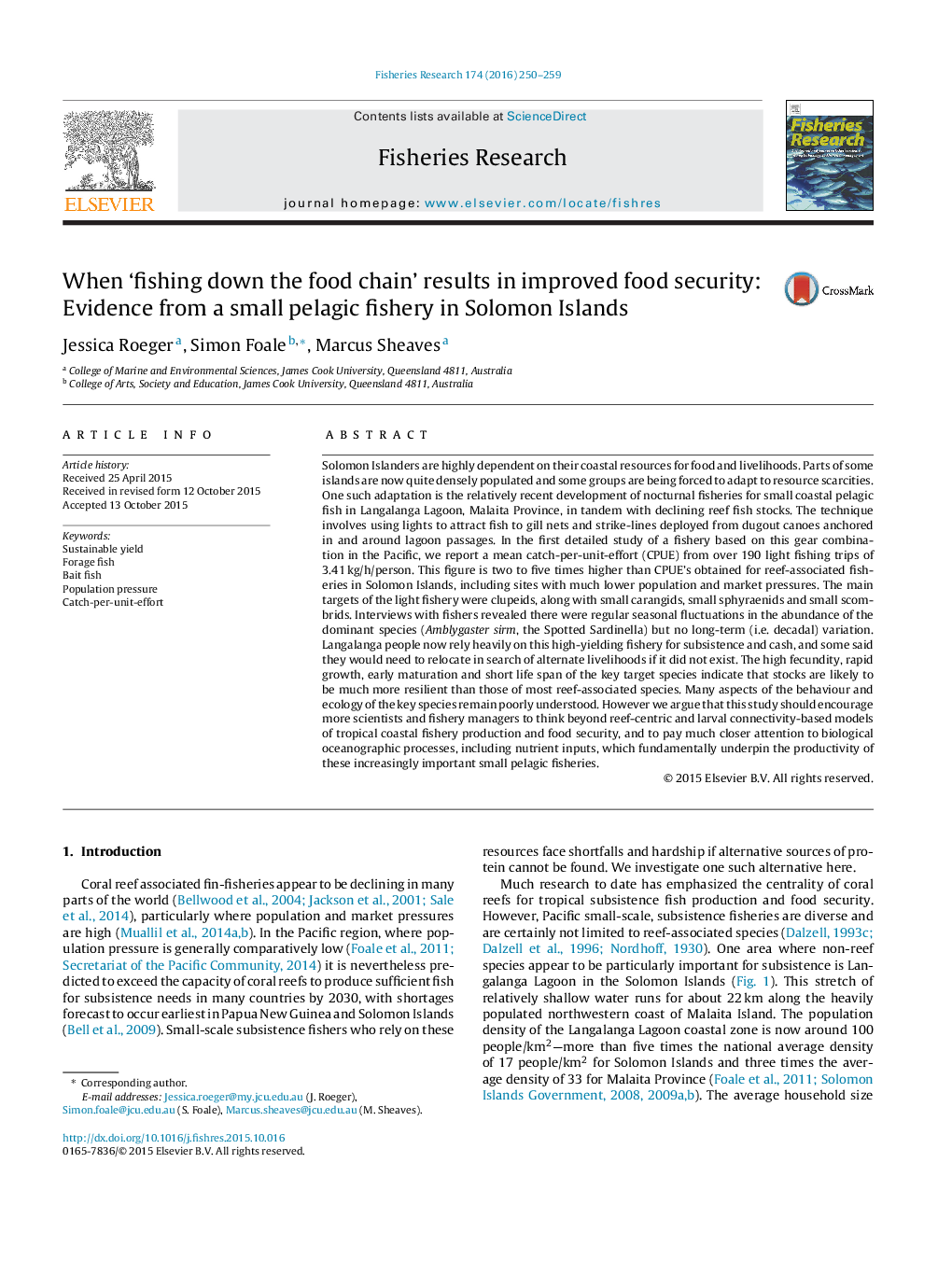| کد مقاله | کد نشریه | سال انتشار | مقاله انگلیسی | نسخه تمام متن |
|---|---|---|---|---|
| 6385608 | 1626795 | 2016 | 10 صفحه PDF | دانلود رایگان |
عنوان انگلیسی مقاله ISI
When 'fishing down the food chain' results in improved food security: Evidence from a small pelagic fishery in Solomon Islands
ترجمه فارسی عنوان
هنگامی که "ماهیگیری در زنجیره غذایی" نتیجه امنیت غذایی را بهبود می بخشد: شواهدی از یک ماهیگیری کوچک در جزایر سلیمان
دانلود مقاله + سفارش ترجمه
دانلود مقاله ISI انگلیسی
رایگان برای ایرانیان
کلمات کلیدی
عملکرد پایدار، ماهی علوفه، طعمه ماهی، فشار جمعیت، تلاش برای گرفتن یک واحد،
موضوعات مرتبط
علوم زیستی و بیوفناوری
علوم کشاورزی و بیولوژیک
علوم آبزیان
چکیده انگلیسی
Solomon Islanders are highly dependent on their coastal resources for food and livelihoods. Parts of some islands are now quite densely populated and some groups are being forced to adapt to resource scarcities. One such adaptation is the relatively recent development of nocturnal fisheries for small coastal pelagic fish in Langalanga Lagoon, Malaita Province, in tandem with declining reef fish stocks. The technique involves using lights to attract fish to gill nets and strike-lines deployed from dugout canoes anchored in and around lagoon passages. In the first detailed study of a fishery based on this gear combination in the Pacific, we report a mean catch-per-unit-effort (CPUE) from over 190 light fishing trips of 3.41Â kg/h/person. This figure is two to five times higher than CPUE's obtained for reef-associated fisheries in Solomon Islands, including sites with much lower population and market pressures. The main targets of the light fishery were clupeids, along with small carangids, small sphyraenids and small scombrids. Interviews with fishers revealed there were regular seasonal fluctuations in the abundance of the dominant species (Amblygaster sirm, the Spotted Sardinella) but no long-term (i.e. decadal) variation. Langalanga people now rely heavily on this high-yielding fishery for subsistence and cash, and some said they would need to relocate in search of alternate livelihoods if it did not exist. The high fecundity, rapid growth, early maturation and short life span of the key target species indicate that stocks are likely to be much more resilient than those of most reef-associated species. Many aspects of the behaviour and ecology of the key species remain poorly understood. However we argue that this study should encourage more scientists and fishery managers to think beyond reef-centric and larval connectivity-based models of tropical coastal fishery production and food security, and to pay much closer attention to biological oceanographic processes, including nutrient inputs, which fundamentally underpin the productivity of these increasingly important small pelagic fisheries.
ناشر
Database: Elsevier - ScienceDirect (ساینس دایرکت)
Journal: Fisheries Research - Volume 174, February 2016, Pages 250-259
Journal: Fisheries Research - Volume 174, February 2016, Pages 250-259
نویسندگان
Jessica Roeger, Simon Foale, Marcus Sheaves,
